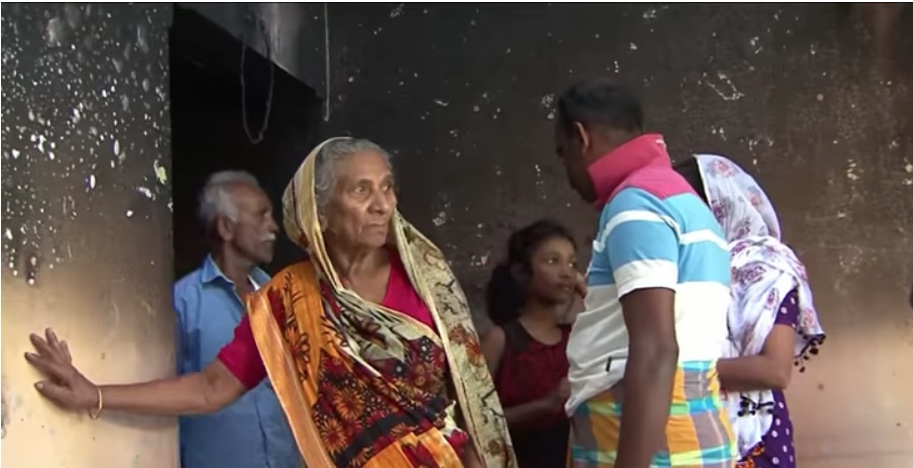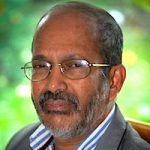Has Anti-Muslim Hate Gone Mainstream As Mahinda Deshapriya Says?


The Daily Mirror of 20th March 2018 carried a rather alarming and distressing news-item on its’ front page. The headline of this news-item read ‘The claim that a majority of Sinhalese were against the recent attacks on Muslims is wrong…‘Most Sinhalese happy about recent attacks’, reporting a speech delivered by a prominent civil servant Elections Commission Chairman Mahinda Deshapriya (MD), interestingly at a workshop on ethnic harmony on the theme’ building bridges’ at SLIDA. Strangely the e-version of this new-item has apparently been withdrawn and is no longer available for on-line access.
After reading his rather alarming speech, the Muslims would have felt like ‘a man being gored by a bull, after falling from the tree’ as a Sinhala idiom goes, only weeks after scores of Anti-Muslim hatemobs swept through Muslim villages, both in the Eastern and Central Provinces engaging in a well-orchestrated campaign of vandalism and arson attacks. MD also reportedly added that a majority of Sinhalese were happy to see the Tamils too being attacked in 1983, only to regret it a few years later, thus demonising the Sinhala people. His speech continued to challenge the Muslims to adopt an indigenous lifestyle and assimilate themselves into a Sri Lanka nation. In the overall context, it raises an all-important question in the minds of all Sri Lankans; not just the Muslims: Has anti-Muslim hate gone mainstream in this Dharma Dweepa?
It is not clear in what context that such sweeping statements were made by a person in the stature of MD who chairs an important public commission such as the Elections Commission. Few possibilities exist: Did the Daily Mirror merely engage in sensationalizing this new-item; the types of sensationalism as the mainstream newspapers do for petty gains, in which events and topics in news stories and pieces are overhyped to present biased impressions on events, which may cause a manipulation to the truth of a story. They knew very well the bad timing of this news and the negative emotional impact and uneasy feelings it may cause in the minds of both Sinhalese and the Muslims specially, upon the heels of a spate of communal violence carried out by hate groups on Muslim areas which caused much damage to the harmony between the two communities. Still they did it and later withdrew the online access. Or did the newspaper quote him out of context(in which case DM would have demanded a correction?( which he did not ); OR Did he say base it on some reliable and valid study/ survey (which is still not known in the public domain)?. It therefore appears that his speech may have been based on his own experiences, hush talks and dog whistles he may have come across during the interactions with his fellow religionists (being a Sinhala Buddhist himself); his gut feelings. However I beg to differ, having lived with Sinhalese and moved with them closely for the most part of my life in Sri Lanka. Besides, feeling happy about the misery of another is very un-Buddhistic to say the least and his remarks will be an insult to the Buddhists too! Only positive aspect will be that it will open up a dialogue on an area of study long hushed up; perhaps an elaborate academic or social study will help to capture public perceptions in this sensitive area.
It has been a fact that Sinhala people at the grass-root/village levels has always been tolerant and lived amicably with the other communities in the South. I can personally vouch for strong bonds of friendship and amity between the Sinhala and Muslim communities, as a social activist hailing from the South. Therefore, MD’s observations that ‘Most Sinhala people are happy about the recent anti-Muslim attacks’ seems not only incorrect but also an outright insult to the tolerant track records of the Sinhala Buddhist people at the grass-root levels, as things stand at present. However, the fact that there had not been any visible objections from the Sinhala Buddhist intellectuals, politicians, or social activists to MD’s offensive and controversial statement about their community appears intriguing.
It has been a historic fact that Ceylon got its’ Independence in 1948 with the support of all communities. It was in 1956 when SWRD become PM on a Sinhala Buddhist platform heavily initiated by some influential sections of the Maha Sangha and then troubles began to brew. Two years later in 1958, the first ever Anti Tamil violence started in Post independence Ceylon. In 1959, SWRD was assassinated by one of the Buddhist monks. Thereafter, the narrow minded political leadership in the years which followed sowed misunderstandings between the two communities, which culminated in the Anti-Tamil pogrom in 1983, leading to 30 years of bloody war fought by a ruthless LTTE terror outfit. Despite Post war hopes of Sri Lankans for peace and amity, MR did not play the historic role of a leader of Post war peace times, which led to another war – a religious war; this time against the other minority-the Muslims. The well-orchestrated hate campaign initiated at the behest of political masters against the Muslims led to creating a climate of fear and insecurity which continues upto this day under various pretexts from 2012. It was these political elements and their cat-paws which should bear the blame and not the Sinhala community at the grass-root levels. However if only the majority community had been more vocal in their opposition; the outcomes would have been much different! As a matter of fact, even the Sinhala community too has not had a good deal to improve their lot from any Post independence governments; on the contrary they too have many grievances to complain of. Tamils have been marginalized too. Thus, all communities are equal on that count!
In fact, in 1983, then President JRJ attempted to indirectly blame the Sinhala people by saying the 1983 attacks was a natural reaction. However, it was no means a mass uprising of the entire Sinhala race against Tamils. As a matter of fact, the majority of the Sinhala people were against what happened then, and also protected and saved Tamils often at great personal risk, as accepted even by many Tamil authors. Otherwise the consequences would have been much grave. Even in the face of provocation from the Tigers who attacked the Dalada Maligawa and also killed many monks in Arantalawa and many other places, the Sinhalese kept their cool. Further, in the case of Post-war anti-Muslim hate campaign during the MR era carried out by the BBS, despite it being well –orchestrated and well-oiled through well – known State patronage, the BJP (BBS Political wing) candidates were not even able to retain their deposits and were rejected in toto by the Sinhala electorate. This was again another good yardstick to measure the stand taken by the Sinhala people about the extremist lines of thinking advanced by the hate groups among them

